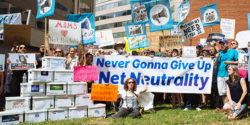On May 18, by a strict 2 to 1 party-line vote, the FCC decided to begin a proceeding to undo the 2015 Open Internet Order, rescinding the network neutrality protections that have been in place for more than two years. It’s something that Chairman Ajit Pai promised to do not long after taking office, and he appears intent on pushing new rules through at full speed.
The 123 page text of the unintentionally ironically named “Restoring Internet Freedom” proposal was just released Tuesday. We’ll be digging in to pull out the most important details, and asking our friend Prof. Christopher Terry from the University of Minnesota help us discern what’s most important. The release of the text opens up the public comment period, which lasts until July 17. This is followed by a reply comment period where anyone can respond to, criticize or laud comments that were submitted.
Given how some congresspeople right now are actively avoiding contact with their constituents so as not to face their concerns about the American Health Care Act, it’s understandable that one might assume that public comments on an FCC proceeding are simply pro forma and don’t carry much weight. Yet, they can make a significant difference, even if the current FCC administration decides to plow ahead in the exact opposite direction of public sentiment.
My colleague Matthew Lasar is an historian who has been watching the FCC closely for decades. He explained clearly why public comments are important on episode #92 of our podcast.
To begin with, “once the FCC makes its decision the chances are pretty good that there will be lawsuits and challenges.”
Given this, the Administrative Procedures Act becomes important. As Matthew puts it, the Act dictates that if a federal agency changes its rules, there has to be a "good, clear and adequate reason for why you changed them. You cannot arbitrarily change them.
“And, in fact, when the FCC changed these indecency rules, the Supreme Court, not too long ago, basically said that the FCC didn’t come up with a good enough rationale… and told them they had to do it again.”
Then, if the Pai led FCC decides to roll back network neutrality protections, it will be up to a federal Appeals Court to decide if the reasons the FCC gave have some logical basis in the law and policy, and, Matthew points out, "whether the facts they offer are worthy.
“And what I think is really important with this Notice of Proposed Rulemaking, is to look at the facts that (the FCC is) using…. to overturn these rules.”
Putting this in practical terms, we can consider Chairman Pai’s argument that the deployment of broadband services has been stunted since the Open Internet Order passed in February 2015. Is this actually true?
As a citizen, you can report on what you see in your community. Have you seen new broadband services offered, or have you been offered services with increased speed? I know that in my neighborhood, just last year one of the local ISPs started offering fiber connections with speeds some 10 to 20 times faster than available in 2015. That’s something I can attest to in my comments.
Of course, there are many more claims of fact the FCC is making that require close scrutiny. Please check back with us as we pull them out of the proposed rule making.
Matthew also observes that proposing to undo the 2015 Open Internet Order
“is a big pivot.” The fact the FCC is making a 180 turn in policy, just two years in, means the FCC “to going to have to make a very very strong case in front of the courts,” to prove that “the previous FCC just got everything all wrong.”
Moreover, “the FCC is compelled to take these comments seriously and integrate them into the written record if they contain detailed information about what’s going on in your local community.” That written record, containing publicly submitted testimony, will come under judicial scrutiny when a lawsuit challenges the Commission’s decision.
Matthew also suggests that you can add gravitas to your comments by filing your comments jointly with other like-minded folks and name yourselves a committee, group or alliance. “I’ve seen this for years,” he attests. “They (the FCC) take those kinds of things very seriously.”
You can submit your own comments and read others’ comment with the shortcut URL GoFCCYourself.com. Free Press’ Save The Internet site also has tools for action. Keep reading Radio Survivor and listening to our podcast for more insight on what to pay attention to.
Image credit: Maria Merkulova / Free Press (CC BY-NC-SA 2.0)



